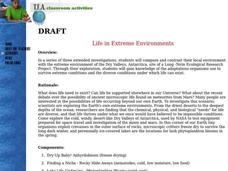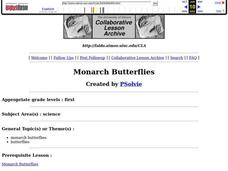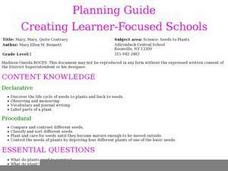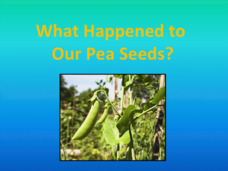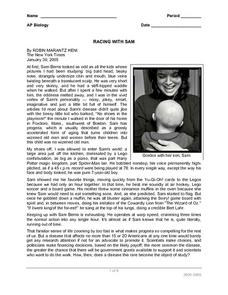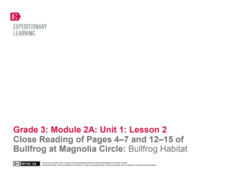Curated OER
Family: The Circle of Life
Students brainstorm family meal traditions and the meaning of "The Circle of Life" while viewing artifacts. They plan a traditional family Thanksgiving meal and write/discuss their own Thanksgiving family meal traditions. Students listen...
Curated OER
Life in Extreme Environments
Students compare and contrast local environments with the extreme environment of the Dry Valleys, Antarctica. Students explore and gain knowledge of the adaptations organisms use to survive extreme conditions and the diverse conditions...
Curated OER
Lance Armstrong: Racing for His Life
Students explore the courage and determination of a cancer survivor. They explore the effects of the disease on Armstrong's life and career, and they witness the strength of an American hero who refused to quit.
Curated OER
My Older Friend
Pupils interview an older friend and establish a timeline for their life. In this biography lesson students complete several activities that have to do with a biography of their old friend.
Curated OER
The Seasonal Round and The Cycle of Life
Seventh graders recognize moments of importance in people's lives and asks them to find meaning in the stages of their own and other's lives. They are taught that all cultures have rites of passage for similar stages in the cycle of life.
Curated OER
Cycles Review
Eighth graders discuss the four major cycles of matter. For this general science lesson, 8th graders decide which of the four is the most important. They share their opinion in class.
Curated OER
Cell Division: The Cell Cycle and Mitosis
Students will be able to identify the different stages of the eukaryotic cell cycle as well as the different stages of mitosis in the proper order. Students will also be able to recognize what organelles of the cell are integral to...
Curated OER
Monarch Butterflies
First graders listen to books about butterflies and look at pictures of butterflies. Students review the stages of butterflies and learn the migratory path the monarch takes in its adult stage.
Curated OER
Adaptable Mandibles
Students define adaptation and highlight example of adaptation in birds and other animals. They study feeding techniques of seabirds and investigate the effect that trash has on wildlife.
Curated OER
Science: Seeds to Plants
First graders compare and contrast different seeds before planting them. They assess the basic needs to plants and conduct experiments of deprivation of those needs. They write stories and draw pictures of plants which are bound into a...
Curated OER
Paper Mache Caterpillar
Students read The Very Hungry Caterpillar by Eric Carle, and practice fine motor skills by using scissors and newsprint strips, and balloons to create paper mache caterpillars.
Curated OER
Harvesting and Threshing the Seed
Students harvest and thresh the seeds. They count the seeds and compare that number with the original number of seeds planted (8) to determine their profit or loss. Finally, students think about additional questions they have about...
Curated OER
Worms Crawl In and Do Lots of Things
Students observe the aquatic segmented worm, Lumbriculus varigatus and the life processes. They explore the processes of nutririon, transport, regulation, locomotion, and removal of wastes.
Howard Hughes Medical Institute
Viral DNA Integration
How do reverse transcriptase inhibitors work? Young virologists examine the function of azidothymidine, a drug doctors use to treat HIV patients, during a hands-on modeling activity. Groups create a strand of DNA from an HIV RNA strand...
GiggleUp Kids
Happy Little Farmer
Pre-readers and primaries can help farmer rabbit to plant some delicious fruits and vegetables. From soil preparation and pest control, all the way to the harvest, little ones participate in the entire process!
Space Awareness
Ocean Acidification
Learn the science behind ocean acidification and its effects on ocean wildlife. Young scientists conduct a laboratory investigation that monitors the acidity level of water. While burning a candle, learners capture the carbon dioxide in...
Primary Resources
What Plants Need to Grow
What do seeds need in order to grow into plants? This presentation follows what happened every four days during a seed growth and observation study. Images compare how well two sets of seeds did under specific circumstances. Use this to...
Dr. Panda
Dr. Panda's Veggie Garden
Friends arrive at the farm and aspiring agronomists help the farmer to grow what the friends want. With adorable animation and charming background music, little ones practice virtual gardening and farming while developing cognitive...
American Physiological Society
What Environmental Conditions Lead to the Hatching of Brine Shrimp?
Will changing the environment in which brine shrimp live impact their reproductive success? Young scientists get hands-on experience studying the habitat of brine shrimp in a two-week immersion lesson. The teacher's guide provides all of...
Curated OER
Racing with Sam
This assignment begins with an 8-page article about Sam Berns, a young man who suffers the rare genetic disease called progeria. Progeria is caused by a gene mutation and manifests itself as rapid premature aging. When your biology class...
Curated OER
The Gopher Tortoise
Can you believe the gopher tortoise was around when the dinosaurs were walking the Earth. Learn all about this creature that is one of Florida's most popular reptiles. Hands-on-activities and a glossary full of scientific terms make this...
University of Minnesota
Manduca sexta Wax Model
Caterpillars' and moths' most obvious change is physical, but what happens to their nervous systems as they complete metamorphosis? Through a hands-on investigation, young scholars construct the nervous system of a caterpillar. They then...
EngageNY
Close Reading of Pages 4 - 7 and 12 - 15 of Bullfrog at Magnolia Circle: Bullfrog Circle
Scholars take part in a close reading of pages four through seven and 12-15 of the book, Bullfrog at Magnolia Circle: Bullfrog Circle by Deborah Dennard. Readers identify the story's main idea, list its key details, and examine...
Purdue University
Reptiles, Amphibians, and the Scientific Method
What do a reptile and an amphibian have in common? A three-part lesson allows scholars to investigate the similarities and differences between the two types of animals by identifying specific body parts. The lesson highlights the...
Other popular searches
- Animal Life Cycles
- Butterfly Lifecycle
- Reptiles Life Cycles
- Life Cycles of Stars
- Spiders Life Cycles
- Insect Life Cycles
- Butterfly Life Cycles
- Plant Animal Life Cycles
- Life Cycles of Animals
- Cycles of Life
- Life Cycles of Frogs
- Plant Lifecycle



